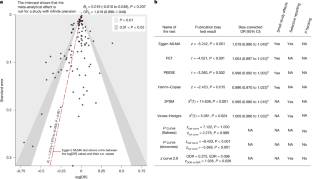
洛桑大学Annahita Ehsan研究团队近日取得一项新成果。经过不懈努力,他们提出了经济不平等对幸福感或心理健康没有元分析影响。相关论文发表在2025年11月26日出版的《自然》杂志上。
在此,研究小组对168项研究进行了荟萃分析,这些研究涉及10个书目数据库(2000-2022年)的多层次数据(来自38,335个地理单位的11,389,871名参与者)。与流行的叙述相反,随机效应模型显示,更不平等地区的个体并没有报告更低的主观幸福感(标准化优势比(OR+0.05) = 0.979, 95%置信区间= 0.951-1.008)。
此外,尽管不平等最初似乎会损害心理健康,但经出版偏差校正后的相关性为零(OR+0.05= 1.019; 0.990-1.049)。荟萃分析效应小于最小感兴趣效应,规格曲线分析在768个备选模型中约95%证实了这些结果。在评估以ROBINS-E和GRADE标准为主题的研究质量和证据的确定性时,ROBINS-E将80%的研究评为高偏倚风险,GRADE将零效应的确定性高于负面效应的确定性。元回归显示,不平等与心理健康之间的不利关联仅限于低收入样本。
此外,机器学习分析表明,在高通胀环境下,与幸福感的关联是负的,而在低通胀环境下,与幸福感的关联是正的。这些缓和效应在盖洛普世界民意调查(Gallup World Poll)的数据中得到了重复(最多2百万参与者)。这些发现挑战了经济不平等普遍危害心理健康并可以为公共卫生政策提供信息的观点。
据悉,人们普遍认为,经济不平等会侵蚀主观幸福感和心理健康,这具有重要的社会影响。然而,现有的研究面临着可重复性问题,理论表明不平等只影响弱势环境中的个体。
附:英文原文
Title: No meta-analytical effect of economic inequality on well-being or mental health
Author: Sommet, Nicolas, Fillon, Adrien A., Rudmann, Ocyna, Cunha, Alfredo Rossi Saldanha, Ehsan, Annahita
Issue&Volume: 2025-11-26
Abstract: Exposure to economic inequality is widely thought to erode subjective well-being and mental health1,2,3,4,5, which carries important societal implications6,7,8,9,10. However, existing studies face reproducibility issues11,12,13, and theory suggests that inequality only affects individuals in disadvantaged contexts14,15,16. Here we present a meta-analysis of 168 studies using multilevel data (11,389,871 participants from 38,335 geographical units) identified across 10 bibliographical databases (2000–2022). Contrary to popular narratives, random-effects models showed that individuals in more unequal areas do not report lower subjective well-being (standardized odds ratio (OR+0.05)=0.979, 95% confidence interval = 0.951–1.008). Moreover, although inequality initially seemed to undermine mental health, the publication-bias-corrected association was null (OR+0.05=1.019; 0.990–1.049)17. Meta-analytical effects were smaller than the smallest effect of interest, and specification curve analyses confirmed these results across ≈95% of 768 alternative models18. When assessing study quality and certainty of evidence using ROBINS-E and GRADE criteria, ROBINS-E rated 80% of studies at high risk of bias, and GRADE assigned greater certainty to the null effects than to the negative effects. Meta-regressions revealed that the adverse association between inequality and mental health was confined to low-income samples. Moreover, machine-learning analyses19 indicated that the association with well-being was negative in high-inflation contexts but positive in low-inflation contexts. These moderation effects were replicated using Gallup World Poll data (up to 2million participants). These findings challenge the view that economic inequality universally harms psychological health and can inform public health policy.
DOI: 10.1038/s41586-025-09797-z
Source: https://www.nature.com/articles/s41586-025-09797-z
Nature:《自然》,创刊于1869年。隶属于施普林格·自然出版集团,最新IF:69.504
官方网址:http://www.nature.com/
投稿链接:http://www.nature.com/authors/submit_manuscript.html
